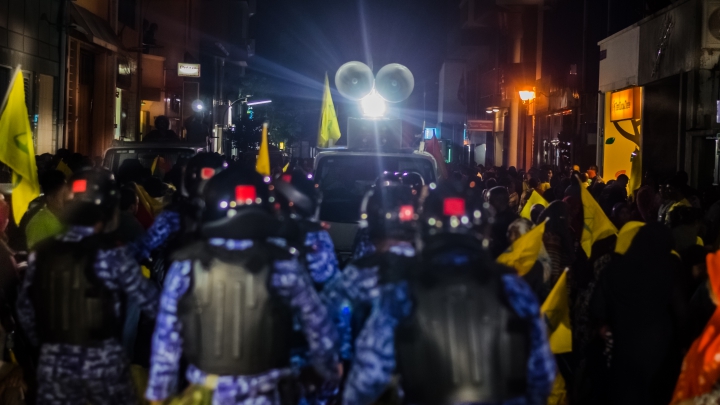The police have banned the use of four-wheeled vehicles in the opposition’s protests without prior permission, prompting concern over “unlawful restrictions” on freedom of assembly.
The police last week said the opposition must obtain prior permission before holding a protest despite a constitutional provision stating no prior notice is needed for demonstrations. Since a mass anti-government protest on May 1, the police have stopped any attempt at street protests by briefly detaining key figures.
In a statement yesterday, the police said the permission to use four-wheeled vehicles was set because a lorry drove at high speed into police lines on May 1 and injured police officers. The step is required for public safety and protection of private property, the police said.
The opposition frequently uses lorries at protests to hold speaker systems, and to publicly announce the opposition activities during the day. The police have previously banned the use of megaphones or speaker systems beyond 11pm.
Some 20,000 people took to the streets of Malé on May Day, after three months of daily protests over the imprisonment of ex-president Mohamed Nasheed and ex-defence minister Mohamed Nazim. The protest was organised by the Maldivians against tyranny coalition – consisting of the Adhaalath Party, the Jumhooree Party and the Maldivian Democratic Party.
Police officers used tear gas, pepper spray, baton charges and stun grenades to break up protests when protesters attempted to enter Malé’s restricted Republic Square. Nearly 200 protesters were arrested and scores were injured, including two police officers.
Speaking to Minivan News, MDP vice president Mohamed Shifaz, said the police have no authority to place restrictions on freedom of assembly.
“The police do not have the right to ask us to obtain such permissions, we will continue to exercise our rights to the fullest extent guaranteed to us by the constitution,” he said.
If a police officer is injured, the police must investigate the case, but cannot restrict the use of vehicles, he said. The police arrested the driver of the lorry used in the May Day protest. The MDP says he was severely beaten.
Shifaz also pointed out Specialist Operations (SO) officers often drive lorries at high speed at crowd of protesters to disperse them.
“The police lorry also drove in to the large crowd of people as well, the chaotic situation on May 1 was created by the police’s pre-planned decision to stop the rally at any cost. They had a zero tolerance policy,” said Shifaz.
The opposition does not condone or encourage violence, he said, adding police chief Hussein Waheed is running the police force like a political party.
However, a police media official said that the constitution does not prohibit the protection of the public. “The law does not obstruct us from protecting the citizens, these are measures we are jurisdictionally allowed to take, but we just have not taken them before,” he said.
He said the police are allowed to drive at high speed, but said the police tactics are different to that of the opposition.
“Sometimes we have to go at high speed, like we did on May 1. That does not compare to the MDP driving past an area declared beyond use by the police, which harmed some of our officers,” he said.
